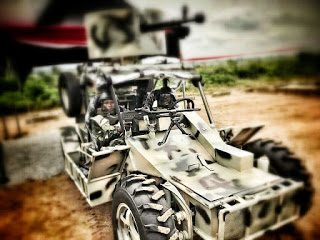Nigerian made indigenous Infantry Patrol Vehicle (IPV). First in Africa.
Although, the dunes buggy isn’t really a new design but in Africa, it’s usage and development has never been done before.
The Nigerian Army engineers Corp known to be innovative and creative in the face of overwhelming obstacle came up with the IPV to tackle the high-speed high-mobility engagement they usually encounter in the arid desert of the north eastern Nigeria.
The incessant attacks by marauding Cattle herdsmen from the Fulani tribe against farmers and villagers prompt the Nigerian military high-command to look inwards and develop a potent solution at a very cost-effective price.
Coupled with the onslaught of the deadly Boko Haram terrorist sect who seems despite all efforts to squash them ironically keeps gaining strength. The Islamic sect usually utilizes fast mountain view to conduct their deadly business in hard to reach areas while escaping in the comfort of their fast and nimble motorcycles and pick-up trucks.
Although, the dunes buggy isn’t really a new design but in Africa, it’s usage and development has never been done before. It came at a time when The Nigerian military was finding its feets in terms of adaptation and adoption of new and trending technologies.
Unlike other patrol vehicles like the Pick-up truck, HMMVEE, MRAPs or APCs, the IPV WAS never intended to Carry substantial armor since the infantrymen would be protected by their own personal armor. However, minimal protection around the engine blocks are usually fitted but at the discretion of the field commanders.
The IPV primary roles includes
- Forward Battlefield Observation
- Rapid Response and engagement
- Reconnaissance behind enemy lines
- Fire support
- Enemy Pursuit in challenging terrains
It however offers increased advantages over existing related vehicles such as:
- Ease in transportation and deployment: It is air transportable and can easily be moved around on the battlefield by transport planes and even helicopters.
- Massive firepower in a small package: It is armed with a 12.7mm Heavy Machine Gun, and a 7.62mm Light Machine Gun. This can be used for fire support role for providing suppressive fire. It is also well suited against mass infantry attacks.
- Speed: Fast attack vehicle: With its light frame and high powered engines, the IPV can move across the battlefield in extremely high speed whether in pursuit of enemies or to quickly reinforced allied forces.
- Superior maneuverability in different terrains: As an all terrain vehicle the IPV can function comfortably in different terrains either in the thick heavily vegetative jungle or in the sparse sandy desert area. It’s excellent suspension system can handle the strain. US Navy seals dunes buggies are known to lift 5 feet into the air in the Afghanistan desert during combat against the Talibans.
- Enhanced surveillance technology: Usually fitted with a thermal camera and laser rangefinders, the enemy would not know that it is being watched. Such technology offers stealthy approach towards hostiles while also providing accurate fire control bearings. Coupled with its low audio/noise signature, it’s enables stealthy approach to a target at pitch black darkness.
- Enhanced battlefield situational awareness: With its open air structure, mounted troops can see and hear everything in their surroundings thereby increasing the soldiers alertness. Any movement around the vehicle can be easily discern and the troops can act decisively. Unlike in an armored vehicle where such capability is negated.

